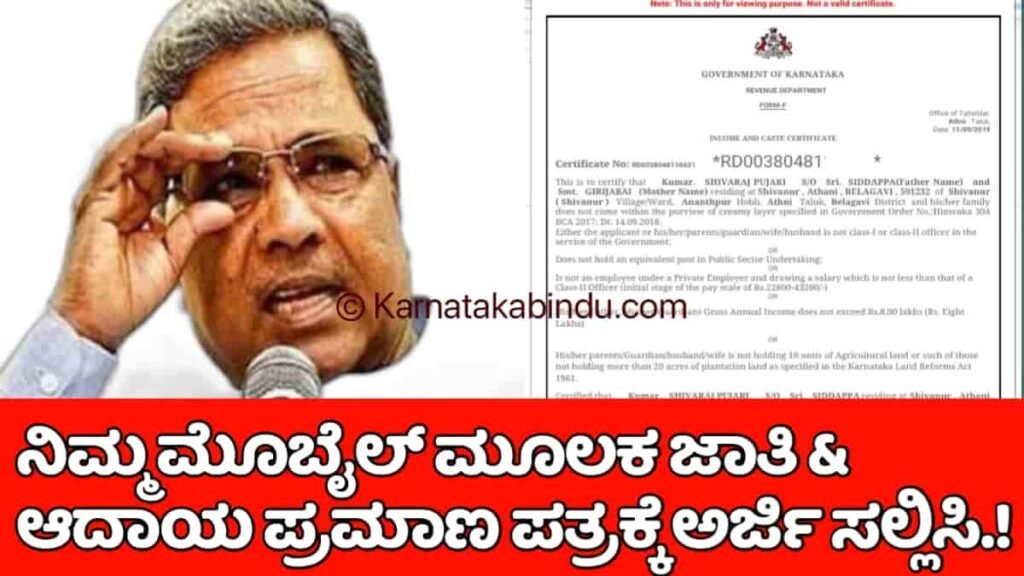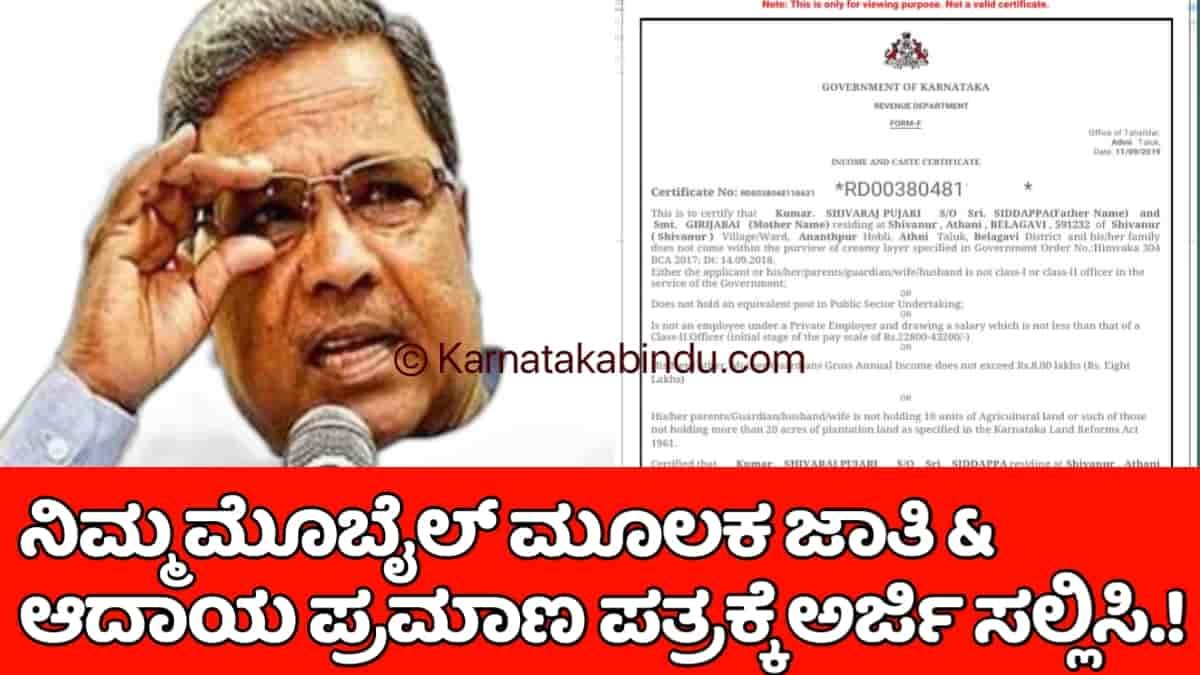In the past, getting a government certificate in India meant standing in long queues, filling out endless forms, and sometimes even visiting the office multiple times. But now, with Karnataka’s push towards digital governance, essential documents like Income Certificate and Caste Certificate can be applied for online—directly from your mobile phone.
This is not just about convenience; it’s about empowerment. By putting government services in the palm of your hand, the state is ensuring that people from both cities and villages can access benefits without unnecessary hurdles.
In this article, we’ll explore the entire process in detail—what these certificates mean, why they are important, how to apply for them through your mobile, and what common challenges you should keep in mind.
What is an Income Certificate?
An Income Certificate is an official document issued by the government that states a family’s total income from all sources. It is usually calculated annually and verified through local administrative officers such as a Tahsildar.
Why It Is Needed:

- To apply for scholarships and fee concessions in schools and colleges
- For reservation benefits in education and employment
- To access government subsidies or welfare schemes
- For loans and financial aid from banks and government institutions
In simple terms, this certificate is proof of your financial background.
What is a Caste Certificate?
A Caste Certificate is a legal document issued by the government that confirms an individual’s caste identity. In India, caste-based reservations and benefits play a crucial role in ensuring social equality.
Why It Is Needed:
- For reservation in educational institutions
- For government jobs under reserved categories
- To avail benefits in government welfare schemes
- For applying to competitive exams where reservation is applicable
Without this certificate, individuals from backward classes (SC/ST/OBC) may not be able to access the opportunities reserved for them.
The Digital Revolution: Applying Online Through Seva Sindhu
The Karnataka government has made it possible to apply for both Income and Caste Certificates online via the Seva Sindhu portal and the Nadakacheri website. This step reduces dependency on physical offices and speeds up the process.
Benefits of Mobile Application:
- No more long queues at government offices
- Apply anytime, anywhere—all you need is internet access
- Faster processing under the Karnataka Sakala Services Act
- Digital tracking system to monitor your application status
- Environment-friendly, since most of the paperwork is online
Step-by-Step Guide: Applying via Mobile
Here’s how you can apply for these certificates directly from your phone:
Step 1: Visit the Official Portal
- Open your browser and go to Seva Sindhu Portal or Nadakacheri Online.
Step 2: Register or Log In
- Use your Aadhaar-linked mobile number or email ID to register.
- You will receive an OTP (One-Time Password) for verification.
Step 3: Select the Service
- From the available services, choose Income Certificate or Caste Certificate.
Step 4: Fill Out the Application Form
- Enter personal details such as name, date of birth, address, parent details, and family income.
- For caste certificate, mention your caste category and sub-category.
Step 5: Upload Required Documents
- Aadhaar card
- Ration card
- Proof of income (salary slip, bank statement, or self-declaration)
- Proof of caste (if applicable)
- Residence proof
Step 6: Pay the Fee (if applicable)
- Some services may require a small processing fee, which can be paid online through UPI, debit/credit card, or net banking.
Step 7: Submit and Get Acknowledgment
- After submission, you will get an acknowledgment slip and a tracking number to check your status later.
Processing and Verification
Once you submit your application, it goes through a verification process:
- Initial Review – The application is checked for errors or missing details.
- Field Verification – In some cases, local authorities may verify your residence or income.
- Approval by Tahsildar/Deputy Tahsildar – After verification, the authority signs off on the certificate.
- Certificate Issuance – You can then download it directly from the portal.
Timeframe Under Sakala Act
The Karnataka Sakala Services Act guarantees timely service delivery. For income and caste certificates, the usual timeframe is 7–21 days, depending on workload and verification requirements.
If the certificate is delayed beyond the stipulated time without a valid reason, applicants can even demand compensation from the concerned office. This makes the system transparent and accountable.
Common Mistakes to Avoid
While the process is simple, applicants often make small errors that delay approval. Here are some tips to avoid rejection:
- Enter your name exactly as it appears on Aadhaar
- Make sure uploaded documents are clear and readable
- Double-check details like address and caste category
- Use a valid mobile number that you can access anytime
Tracking Your Application Status
The tracking system makes the process user-friendly:
- Go to the Seva Sindhu portal
- Enter your acknowledgment number
- You’ll see the real-time status—pending, under verification, or approved
Once approved, you can download the certificate in PDF format directly to your phone.
Frequently Asked Questions (FAQs)
1. Do I need to visit the office at any stage?
In most cases, no. But if your documents need additional verification, you might be called once.
2. How much does it cost?
Applying is either free or involves a nominal fee (₹15–₹50 depending on the certificate).
3. Can I apply on behalf of my family members?
Yes, you can apply for dependents like children or elderly family members, provided you upload the required documents.
4. Is Aadhaar mandatory?
Yes, Aadhaar is usually mandatory for identity verification.
5. Can rural applicants also apply online?
Absolutely. Even in rural areas, applications can be submitted via mobile. Many Bapuji Seva Kendras also assist villagers in applying online.
Advantages Over Traditional Method
Let’s quickly compare the old and new system:
| Aspect | Old Method (Offline) | New Method (Online via Mobile) |
| Travel | Multiple office visits | Zero travel, apply from home |
| Time | Could take weeks | Usually 7–21 days |
| Cost | Travel + paperwork fees | Minimal or no cost |
| Transparency | Limited status updates | Real-time online tracking |
| Accessibility | Dependent on location | Available to all citizens with internet |
Real-Life Example
Take the case of Ramesh, a college student from a small town in Karnataka. He needed his income certificate to apply for a state scholarship. Instead of traveling 30 km to the Taluk office, he applied online using his phone. Within two weeks, he downloaded the approved certificate and submitted it to his college on time.
Stories like these show how digital governance saves not only time but also money and effort.
Apply online
Application link
Final Thoughts
Government paperwork has always been considered a hassle in India. But Karnataka’s initiative to make income and caste certificates accessible online through mobile has changed the game.
Today, whether you’re a student applying for scholarships, a job aspirant seeking reservation benefits, or a citizen applying for welfare schemes, you don’t have to waste hours at government offices. All you need is your smartphone, internet access, and a few scanned documents.
This system reflects the larger vision of Digital India—a country where essential services reach every citizen efficiently, transparently, and fairly. By embracing this system, citizens can save time and access the opportunities they deserve without unnecessary obstacles.
